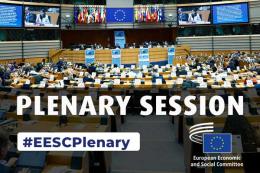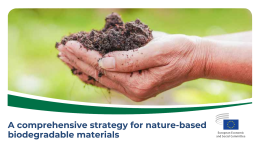European Economic
and Social Committee
Main navigation
-
About
ABOUT
The European Economic and Social Committee (EESC) is the voice of organised civil society in Europe.
Find out more about its role and structure at http://www.eesc.europa.eu/en/about
- Political organisation
- Administrative organisation
- Cooperation with other Institutions
- Rules
-
Our work
OUR WORK
The EESC issues between 160 and 190 opinions and information reports a year.
It also organises several annual initiatives and events with a focus on civil society and citizens’ participation such as the Civil Society Prize, the Civil Society Days, the Your Europe, Your Say youth plenary and the ECI Day.
Find the latest EESC opinions and publications at http://www.eesc.europa.eu/en/our-work/opinions-information-reports/opinions and http://www.eesc.europa.eu/en/our-work/publications-other-work/publications respectively.
- Opinions and Information Reports
- Documents
- Publications and other work
-
Civil society and citizens' participation
- Civil Society Week
- European elections 2024
- Civil Society Prize
- The Conference on the Future of Europe
- European Democracy Passport
- Your Europe, Your Say!
- European Citizens' Initiative (ECI)
- The path to our industrial future
- Youth Climate and Sustainability Round Tables
- EU Organic Awards
- Civil Society Against COVID 19
- EESC stands with Ukraine
- Partnerships
- Relations with ESCs
-
Policies
POLICIES
The EESC is active in a wide range of areas, from social affairs to economy, energy and sustainability.
Learn more about our policy areas and policy highlights at http://www.eesc.europa.eu/en/policies
-
Policy areas
- Agriculture, Rural Development & Fisheries
- Climate Action
- Cohesion, Regional & Urban Policy
- Consumers
- Digital Change & Information Society
- Economic & Monetary Union
- Education & Training
- Employment
- Energy
- Enterprise
- Environment
- External relations
- Financial Services & Capital Markets
- Fundamental & Citizens Rights
- Housing
- Industry & Industrial Change
- Institutional Affairs & EU Budget
- Migration & Asylum
- Research & Innovation
- Services of General Interest
- Single Market
- Social Affairs
- Sustainable Development
- Taxation
- Transport
-
Policy areas
-
Agenda
AGENDA
The EESC holds nine plenary sessions per year. It also organises many conferences, public hearings and high-level debates related to its work.
Find out more about our upcoming events at http://www.eesc.europa.eu/en/agenda/our-events/upcoming-events
- Our events
-
News & Media
NEWS & MEDIA
Here you can find news and information about the EESC'swork, including its social media accounts, the EESC Info newsletter, photo galleries and videos.
Read the latest EESC news http://www.eesc.europa.eu/en/news-media/news and press releases http://www.eesc.europa.eu/en/news-media/press-releases
- President
-
Members & Groups
MEMBERS & GROUPS
The EESC brings together representatives from all areas of organised civil society, who give their independent advice on EU policies and legislation. The EESC's326 Members are organised into three groups: Employers, Workers and Various Interests.
Find out more about our Members and groups at http://www.eesc.europa.eu/en/members-groups
- Members
- Groups
-
Sections & Other Bodies
SECTIONS & OTHER BODIES
The EESC has six sections, specialising in concrete topics of relevance to the citizens of the European Union, ranging from social to economic affairs, energy, environment, external relations or the internal market.
Find out more at http://www.eesc.europa.eu/en/sections-other-bodies
-
Sections / Commission
- Economic and Monetary Union and Economic and Social Cohesion (ECO)
- Single Market, Production and Consumption (INT)
- Transport, Energy, Infrastructure and Information Society (TEN)
- Employment, Social Affairs and Citizenship (SOC)
- Agriculture, Rural Development and Environment (NAT)
- External Relations Section (REX)
- Consultative Commission on Industrial Change (CCMI)
- Observatories
- Other
-
Sections / Commission
- Ukraine






